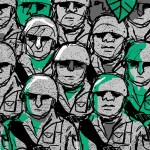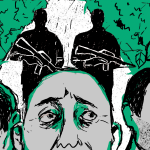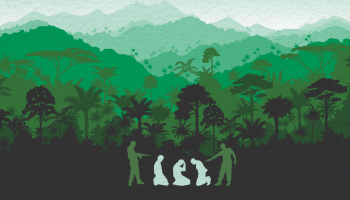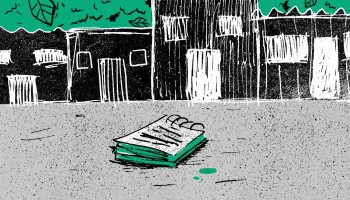Every couple of days in February and March, Alejandro Zaldumbide, a major in the Ecuadorian police based in the border town of San Lorenzo, received WhatsApp messages from mysterious Colombian numbers.
While it’s impossible to verify their precise provenance, Zaldumbide’s first contact in this chain identified himself as Andres Sinisterra, a suspected member of the Oliver Sinisterra Front. This armed group of former FARC members trafficks drugs and periodically attacks government forces in the heavily forested Mataje region, a border area between Colombia and Ecuador.
After March 16, Zaldumbide began corresponding with someone who identified himself as El Guacho, the nom de guerre of Sinisterra Front leader Walter Patricio Arizala Vernaza.
Zaldumbide, the police major, previously worked in anti-extortion and anti-kidnapping units and wrote a series of reports to his superiors about these exchanges. He included full transcripts of the discussions. Journalists have obtained the reports, which offer a first-hand look at Zaldumbide’s attempts to negotiate with the Oliver Sinisterra Front for the release of two journalists and a driver kidnapped by the guerillas March 26 and murdered a few weeks later.
Before his abduction, El Comercio journalist Javier Ortega learned of this communication channel between the Ecuadorian government and the guerillas. (See: The Story Javier Ortega Never Wrote)
Below are excerpts from Zaldumbide’s conversations with the guerillas, who openly threatened violence against both Ecuadorian military personnel and civilians. They also contain Guacho’s first assertion to Zaldumbide that his group had captured the three men.
February 20
... On January 13 of the current year I received several text messages via WhatsApp from a Colombian telephone number; messages about which I notified in detail my Colonel Nelson Ortega Curipallo through Captain Miguel Cordoba. [Captain Cordoba] instantly drafted a report with the necessary supporting documentation and informed the upper echelons [of command] of the news.
February 25
I hereby respectfully inform you, my Colonel, that today, after I noticed two telephone numbers listed on the screen of my telephone ... I dialed the said [caller]. Among other points, the following main topics were discussed:
I told him that we are waiting for a meeting between my Generals regarding his request, in which he demanded an end to messing with his people, as well as the withdrawal of the Ecuadorian military from the border.
I told him that our main request was (that he) not cause harm to the population in Ecuador, in response to which he said that he would speak with his people [to have them] withdraw their troops by Tuesday.
I asked him who was the person that gave him my number and whether he knows me. He responded that he has people everywhere and has ways to obtain such information, stating that [he knows] I am the colonel of the San Lorenzo police.
March 10
...Today I started to receive several messages via WhatsApp ... from a subject who identifies himself as “Andres Sinisterra,” the same person who, among other things, claimed the following:
He stated that his boss was upset and angry because he was not granted a personal meeting to negotiate and deal with peace agreements ... as various conditions and requests made by his armed group led by “Guacho” had not been met. I responded that we were still waiting to set up the meeting.
March 12
...Today I started to receive several text messages via WhatsApp ... from a subject who identifies himself as “Andres Sinisterra” ...
He asked what the result had been regarding the meeting to be held to discuss a peace agreement. I responded that several government bodies were meeting to finalize the matter and possibly appoint a representative for the meeting. The said subject said that one of the several requests made by his armed group concerned the release of several detainees by the Ecuadorian police. I responded all that would be discussed at the meeting and that in the meantime he should speak with “Guacho” to ensure that no illegal acts or material and human harm were committed against the Ecuadorian population.
March 14
“Today I started to receive several text messages via WhatsApp ... from a subject who identifies himself as “Andres Sinisterra” ...
He demands to know the immediate results to the various requests made by his armed group, to which I responded that I would meet with my superiors the next day to receive orders.”
March 16
“Today I began to receive several text messages via WhatsApp ... from a Colombian mobile telephone number used by an identified person (presumably Guacho.)”
Guacho: “Hey, what’s up? Last night your troops went into my house and mistreated my family. That’s serious, buddy. Deal with the consequences for your entire country, its people, civilians, military, police … I told you not to mess with [my] family.”
Zaldumbide: “Good afternoon. Look, Guacho, we had an agreement, and the deal was that you do not harm the Ecuadorian population.”
Guacho: “OK, but do what we tell you or tomorrow I’ll put one [a bomb] in fucking Quito [the Ecuadorian capital.] It’s simple: continue the links with Colombia and mistreat my family like you did last night at two o’clock in the morning and for that you’ll pay.
Zaldumbide: “We are trying to resolve everything, Guacho. But today early in the morning you set off another bomb. And you have to understand, all that will cause problems for the peace process we want to establish.”
Guacho: “Tomorrow is [too] late. … Tell me whether you will send a delegate to the entrance of Puerto Rico [village] in Mataje, or we will launch another military operation.
Don’t try to mislead me. Come here tomorrow and bring one of your guys as a guarantee. Then we’ll speak. What do you say?”
Zaldumbide: “I’ll be very honest with you Guacho, a delegate has already been appointed to speak with you.”
Guacho: “So let’s do it, man, for that I’m here to listen. Well, tomorrow is late. Tonight I could blow up truckful of soldiers. Tell me to stop my orders and let’s talk.”
Zaldumbide: “I was calling you to let you know how things stand.”
Guacho: “...Or I could look for the president’s number. Tell me now because I am also able to speak to the president himself. [After all], he’s from the Alfaro Vive!
(Ecuadorian President Lenin Moreno is rumored to have been part of this leftist guerilla group which was active in Ecuador in the 1980s.)
Zaldumbide: “It would be good if you called me, please, Guacho. I can let you know how things are. Or tell me what number I can call you on.”
Guacho: “Just look at my requests. I won’t back down, even if I have to die fighting for my homeland, man.”
Zaldumbide: “As I told you, Guacho, the delegate was ready to meet you. But given what happened, he turned back. And since this morning we’ve been trying to find somebody who wants to help us.”
(Zaldumbide here refers to a car bombing by the Oliver Sinisterra Front at a military roadblock in an Ecuadorian border town. No one was killed.)
Guacho: “Well why don’t you send him, then. What’s with the teasing? If we stop talking, you’ll say that I’m the bad guy. But I remind you that they got into my mother’s house and mistreated my family. Damages have to be paid [for that], man. Talk later.”
Zaldumbide: “We have time to talk, negotiate, and reach agreements logically. You’re a smart guy, Guacho, I know you understand me.”
Guacho: “That doesn’t convince me. Send your delegate tomorrow otherwise I’ll shut down this number and people will get hurt. There will be dead civilians. Avoid that, man.”
...
Zaldumbide: “That’s why I’m asking you for a very special favor: give us this weekend to appoint the delegate. Have patience, Guacho, please. Have trust in our procedures.”
Guacho: “You know that I do not play around or blackmail, man. Do it for your country or you will see that we can either talk or we can fight.”
Zaldumbide: “Once again I ask you for a special favor: please give us the weekend to appoint our delegate.”
Guacho: “You have my people under arrest and you want me to be patient? Just what do you want me to do, you bastard?”
Zaldumbide: “We’re working on it. For sure this weekend we’ll sort the matter out. That’s why I’m asking you to give us the weekend, please. We’re ready for dialogue. And I repeat, we had already appointed a delegate but because of what happened this morning with the bomb, the person saw no guarantees and turned back.”
Guacho: “So go and take away your shitty soldiers from here, and talk to me; give me the answer right now. Tell me.”
Zaldumbide: “They’re military. We don’t have direct control over them. That’s why we have to coordinate with all the ministries to deal with your request.”
Guacho: “So I’m not just talking to the police; I’m talking to all you soldiers and police. Man, this is a gesture that you don’t want peace in our country. My orders still stand; we’ll attack anything we see.”
Zaldumbide: “Look Guacho, we’re not going to be able to reach a dialogue and negotiate with you if you’re still committing attacks in Ecuador. That’s why I’m asking you to please give us this weekend, and we’ll surely reach an agreement. Help us with that and we’ll help you out by finding a delegate [to negotiate with you].”
Guacho: “For everything that was stolen from my family I’m going to launch an attack at the very least. For everything those sons of bitches stole from me. Paint it however you want; I am already losing patience. As for the civilians I find at the border, I’ll kill the sons of bitches. I am losing my patience to give you a weekend.”
Zaldumbide: “I ask you to be patient, Guacho, please. Help me out with the weekend. That’s all we’re asking of you.”
March 18
Zaldumbide: “And now you are still making threats and continuing with the attacks. How do you expect to negotiate?”
Andres Sinisterra: “Yeah sure. Whatever. Either way, man, there are wars around the world — worse wars. These are just skirmishes.”
Zaldumbide: “I’ll say it again, Andres, we want peace. We’ve never been at war and we don’t want to be.”
Andres Sinisterra: “Yep, we’re the same. That’s why we’re waiting. Waiting and waiting.”
...
Zaldumbide: I told Guacho to give us the weekend that by tomorrow we would have a delegate. But you’re continuing with the attacks and this way we will not be able to reach an agreement.”
Andres Sinisterra: “Well send somebody to tell us personally that there is going to be an agreement then.”
Zaldumbide: “How can we meet with you if you threaten kidnappings and stuff like that?”
Andres Sinisterra: “They’d stop all that straight away. That’s how. Man, just send somebody tomorrow.”
Zaldumbide: “We need guarantees that the lives of the people [we send] to meet with you are going to be respected. Where do you want us to send the delegate?”
Andres Sinisterra: “Well, yeah”
Zaldumbide: “And at what time?”
Andres Sinisterra: “There’s no problem. Let’s make it tomorrow, man, and we’ll stop all this right away. You’ll see.”
...
Andres Sinisterra: “So it goes like this: [the delegate] arrives and says we’re going to give this and that, and that’s how we deal with the conflicts.”
Zaldumbide: “Andres, let’s do something.”
Andres Sinisterra: “While we’re still in agreement… Sure, tell me.”
Zaldumbide: “I’m asking you as a special favour, please.”
Andres Sinisterra: “Yes”
Zaldumbide: “Call me or text me at 9 a.m. and we’ll put an end to this matter right away. Believe what I’m telling you. It’s the last thing I’m asking you for.”
Andres Sinisterra: “But send him [the delegate] and you’ll see.”
Zaldumbide: “That’s why you should write to me tomorrow at 9 a.m. to tell me where the delegate should meet [you] and where.”
Andres Sinisterra: “When they come that will be a gesture of peace.”
Zaldumbide: “So let’s do that, Andres.”
Andres Sinisterra: “So I can travel to where the boss [Guacho] is [and discuss the proposals].”
From Zaldumbide’s report to his superiors on March 18:
Bearing all the aforementioned in mind, and in virtue of the most recent unfortunate events which took place in the canton of San Lorenzo, I would like to ask you, Colonel, to study, analyze and approve the formation of a joint crisis committee involving the police, military, and civilian authorities. Each of the members of said crisis committee should have designated roles and responsibilities, thus avoiding the centralization of any decision-making process or procedure in any one institution — in particular, the National Police.
March 20
Guacho: “What’s up? Tell me if you have some news. What do your superiors say?
Zaldumbide: “Hi Guacho, good evening. How are you? I was in a meeting so couldn’t respond to your messages and call. This is the best thing you’ve thought of, Guacho, I thank you for that. You are an Ecuadorian with Ecuadorian blood and family in Ecuador. You have to think of them. We all want to live in peace without any problems. I’m waiting for my superiors’ response; they haven’t said anything yet. They’re meeting right now and I’m going to wait until they tell me something.”
...
Guacho: “So you tell me not to attack but then you assure me that your troops are not going to attack us. How can you assure us of that? We agreed to a ceasefire [on the conditions that] the detainees are released and [the Ecuadorian government] discards the [counter-terrorism] agreement they have with Colombia ... Send me a radio frequency so I can talk to the commanders in charge of the area so as to avoid attacks. But first, show me good gestures of dialogues and peace in order for us to stop… or did you think that we were some little group of thieves rather than gentlemen? We are guerillas. I remind you that we have our own statutes, rules, and discipline.”
...
Zaldumbide: “But understand that the latest events have generated delays in the negotiation. We asked you to not touch the Ecuadorian population and you did not keep your word. We are still open to negotiation but stop your military activities, please. Meanwhile, today I am going to let my superiors know about your requests. As soon as I know their answer, I’ll text you or call you. Keep an eye on your phone, please. Guacho, thank you.”
Guacho: “Man, but who guarantees me that your troops will not open fire against mine. Tell me that or do you think that I don’t know that.
Until you make a public declaration of a ceasefire and disavow your agreement with the Colombians to fight us, we’ll be there [at the border], man.”
Zaldumbide: “Guacho, the only thing we’re doing is taking care of our territory. We don’t attack anybody as long as they don’t attack us. I will let me superiors know about your request and I’ll write to tell you what result we have.”
March 21
Guacho: “They just published that you declared war on us, I’ll also attack with even more force in all areas of your country, man. You didn’t want to find a mechanism for dialogue, and now I like to talk about war tomorrow. I’ll show you what can happen in this country. When you want to talk, you’ll find us. But for the meantime, there’s no truce [anymore].”
(On March 20, references to a military document circulated on Ecuadorian social networks, implying that the country’s military was about to launch “total war” against guerillas in the Mataje River region. The news later turned out to be unsubstantiated, and the Ministry of Defence dismissed the letter as a “fake document.”)
Zaldumbide: “Let’s go little by little, Guacho; who declared war on you? We, the police and military, have never invaded Colombian territory, much less your area of influence. The only thing we do is take care of our national territory and nothing beyond that. Nobody is talking about war; on the contrary, we are looking for ways to reach a dialogue. But you are responsible for complicating the whole process yourself, with these attacks you are launching across Ecuador. Our first requirement, as we asked, was that you do not launch attacks in Ecuador. And you have not complied. So how do you expect to reach an agreement?”
March 26
... I respectfully inform you, colonel, that today, from 5 p.m., I began to receive several text messages via WhatsApp ... from a Colombian telephone number … used by an unidentified subject (probably Guacho) who stated the following:
Guacho: Hey. If you are still on this number, you’ll [want to see] what I have to inform you. I have captured three people, Ecuadorians: two journalists from Quito and their driver. The lives of these people are in your hands…
...
Hey, what’s up? You have to give me an answer in ten minutes otherwise these people will disappear.
Zaldumbide: Hi Guacho, good evening. Can I call you?
Guacho: You know that I don’t answer calls.
Zaldumbide: I would like to talk with you.
Guacho: Over these minutes you haven’t given me a clear answer. Every day you will lose people, soldiers and civilians. You provoked this. Ciao then.
April 15
Zaldumbide: “Guacho, I know that you are an intelligent person and that you know how this matter is handled. The police do their job, the judges and prosecutors do theirs, and I know that you understand that. That’s why, Guacho, I tell you that Dr. Maldonado will help you with your request. Trust me, Guacho, believe what I’m saying.”
Guacho: “To Mr. President Lenin Moreno, and your cabinet of police and soldiers: receive a cordial greeting from the Oliver Sinisterra Front. The next thing to tell you is that we are holding two of your undercover agents, and we consider them soldiers. We are going to do things calmly and quickly. You have 12 hours to give us back the prisoners you have in your country and we will give you the two detainees. I’m telling you, Mr. President, do not risk your soldiers, policemen, and agents. Don’t put your country in the crossfire. Each one of us revolutionaries has [paid] a price for seeking the common good of all those who have been forgotten by the governments. We remind you that we are FARC; even if they kill us, our struggle still stands because the war comes from unemployment, inequality, hunger, and the total abandonment of the government. Even though you seek a military solution to the peasants, you will never defeat a guerilla. Look for the solution by focusing on each farmer, each community, each neighborhood, create employment by helping the needy. We commit ourselves as guerillas and revolutionaries to making peace with you, and as long as you respect the troops of the Oliver Sinisterra Front we will respect your soldiers and police. The final decision is yours, Mr. President Lenin Moreno: peace or war for your entire country.
I have also been told that you are holding my nephew. Please let him go because he has nothing to do with this problem. Otherwise each of your Ecuadorian citizens will pay the price for my nephew. You have innocent people in those prisons.
Say something.
Now you’ll see that I’m talking seriously, son of a bitch.”







